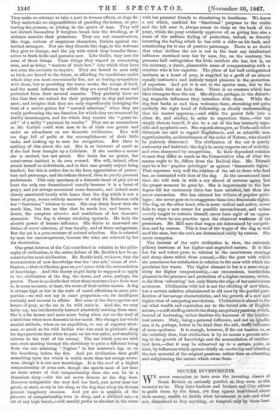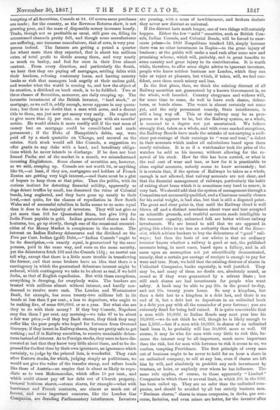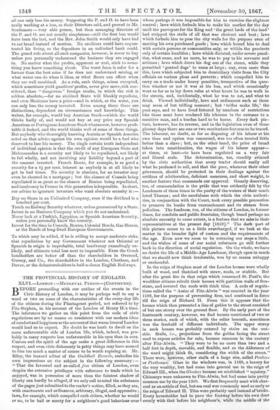SECURE INVESTMENTS.
WE never remember to have seen the investing classes of Great Britain so seriously puzzled as they seem at this moment to be. They have bankers and brokers and City editors to guide them by the dozen, yet they appear bewildered about their money, unable to decide what investment is safe and what not, disinclined to buy anything, or tempted only by those least tempting of all Securities, Consols at 94. Of course some purchases are made ; for the country, as the Revenue Returns show, is not growing poor, and the mass of .disposable money increases hourly. Trade, though not as profitable as usual, still goes on, filling its accustomed channels pretty full, and though some manufactures are suffering, one immense manufacture, that of corn, is very pros perous indeed. The farmers are getting a pound a quarter for wheat more than they expected, that is about ten millions extra of total profit to divide among them, and very nearly as much on barley, and feel for once in their lives almost content. From every direction, and particularly the South, we hear that they are paying off mortgages, settling debts with their bankers, refusing customary loans, and leaving country banks so rich that managers look angrily at their useless gold, and wonder what the world is coming to, and how the object of its creation, a dividend on bank stock, is to be fulfilled. Two or three classes of Securities, moreover, are daily creeping up. The favourite investment of the British investor, " land stock," or mortgage, as we call it, oddly enough, never appears in any quota- tion; bat there is no doubt that a man with acres, and a decent title to them, can just now get money very easily. He ought not to give more than 3i per cent. on mortgages with six months' notice. He would obtain it more readily still if the vast mass of money lent on mortgage could be consolidated and made permanent ; if the Duke of Hampshire's debts, say, were paid off by a stock quotable on 'Change, and secured on the estates. Such stock would sell like Consols, a suggestion we offer gratis to any duke with a head, and hereditary obliga- tions which he never intends to discharge.- If he does not beat Ismael Pacha out of the market in a month, we misunderstand investing Englishmen. Some classes of securities are, however, as we said, creeping up. Consols are not worth 94, or anything like 94,—at least, if they are, mortgagees and holders of French Rentes are getting very high interest,—and there must be a glut of buyers to keep them at that price. Then the public, with its curious instinct for detecting financial solidity, apparently as dogs detect truffles by smell, has discerned the value of Colonial bonds, long neglected, and they have gone up nearly to their level,—not quite, for the chance of repudiation in New South Wales and of successful rebellion in India seems to us more equal than it does to the majority of investors. They will not give as yet more than 103 for Queensland Sixes, but give 100k for India Fours payable in gold. Indian guaranteed shares and de- bentures, too, go tip slowly, though one of the occasional eccentri- cities of the Money Market is conspicuous in the matter. The interest on Indian Railway debentures and the dividend on the Five per Cent. Indian (gold) Debt,—" Indian Consols " ought to be its description,—is exactly equal, is guaranteed by the same persons, paid in the same way, and rests on the same security, jet the debentures fetch 102 and the Consols 1151( ; no mortal can tell why, except that there is a little more trouble in transferring the former, and that some brokers have an idea that there is a contingency in which the guaranteed debenture interest might be reduced, which contingency we take to be about as real, if we hold India, as that of English repudiation. But with these exceptions, -everything is drooping, for everybody waits. The bankers are trusted with millions almost without interest, and hardly con- descend to receive more cash. The London and Westminster Bank, for example, has some twenty-two millions left in its hands at less than 2 per cent., a loss to depositors, who ought to be making five, of some 600,0001. or so a year. But what else are they to do with their money? If they buy Consols, Napoleon may fine them 7 per cent. any morning—we take 87 to be about a fair war price ;—if they buy Bank shares, they think they may -suffer like the poor people who hoped for fortunes from Overend Gurneys; if they invest in Railway shares, they are pretty safe to get nothing ; and if in Railway securities, to receive unsaleable deben- tures instead of interest. As to Foreign stocks, they seem to have dis- covered at last that they know very little about them, and to be de- pressed for thefirat time by their own ignorance, an ignorance which certainly, to judge by the printed lists, is wonderful. They rush .after EaStern stocks, for which, judging simply as politicians, we would not give the value of the transfer stamp, and refuse bonds like those of Austria—an empire that is about as likely to repu- diate as to turn Mahommedan, which offers 10 per cent., and which could almost pay off her debt out of Church property. General business shares,—steam shares, for example—what with hurricanes and French contracts, are almost as much out of favour, and some • important concerns, like the London Gas Companies, are dreading Parliamentary interference. Investors
are pausing, with a sense of bewilderment, and brokers declare they never saw distrust so universal.
If the distrust lasts mach longer, one of two things will certainly happen. Either the few " solid " securities, such as British Con- sols, Indian Consols, and Colonial Bonds, will be forced to enor- mous prices—in 1860 Neapolitans touched 120, simply because there was no other investment in Naples—to the great injury of business ; or the public will make a mad rush after some new and promising scheme, which will, probably, end in great benefits to some country and great injury to its contributories. It is worth while, therefore, to offer some slight advice to ignorant investors, people who know neither business nor London, which they can take or reject at pleasure, but which, if taken, will, we feel con- fident, save them much misery and loss.
In the first place, then, we think the existing distrust of all Railway securities not guaranteed by a known Government is, on the whole, well founded. Country clergymen and widows will, for some time to come, do well to leave such shares, deben- tures, or bonds alone. The worst is almost certainly not come yet, and the only permanent remedy, State interference, is still a long way off. This or that railway may be as pros- perous as it appears to be, but the Railway system, as a whole, is unsound to a degree not yet ascertained. We believe strongly that, taken as a whole, and with some marked exceptions, the Railway Boards have made the mistake of not carrying a suffi- cient per-centage of their earnings to " wear and tear," a defect in their accounts which makes all calculations based upon them nearly valueless. It is as if a watchmaker took the price of the watches he sold as his income, without allowing for the re • newel of his stock. How far this has been carried, or what is the real cost of wear and tear, or how far it is practicable to close capital accounts, nobody seems to know accurately ; but it is certain that, if the system of Railways be taken as a whole, enough is not allowed, that railway accounts are not clear, and that the financial management of railways, particularly the habit of raising short loans which it is sometimes very hard to renew, is very bad. We should add that the system of management through a Committee not necessarily qualified, and a Chairman usually chosen for his social weight, is bad also, but that is still a disputed point. The great and clear point is, that until the Railway cloud is well blown off and a distinct conclusion about wear and tear accepted on scientific grounds, and truthful accounts ,made intelligible to the meanest capacity, unlearned folk are better without railway investments. We are bound to add that we are opposed in giving this advice to no less an authority than that of the Econo- mist, which advises bankers to buy the debentures of " good " rail- ways ; but then the basis of our advice is that no ordinary investor knows whether a railway is good or not, the published accounts being, in most cases, based upon a fallacy, and in all cases upon an assumption not yet scientifically demonstrated, namely, that a certain per tentage of receipts is enough to pay for wear and tear. Next, we hold that the existing distrust of shares in Unlimited Companies, banks especially, is well justified. They may be, and many of them no doubt are, absolutely sound, as sound as if they were guaranteed by a solvent State ; but still such shares are bad investments for people who want safety. A bank may be able to pay 30s. in the pound to-day, and not 10s. twenty years hence. So may a kingdom, but then a debt lost to a kingdom is a debt lost, and there is an end of it, but a debt lost to depositors in an unlimited bank is a debt you pay with all the remainder of your fortune ; you are ruinously fined for being half ruined. It is quite conceivable that a man with 10,0001. in Italian Bonds may next year lose his 10,000/.—we do not think he will, though he is likely enough to lose 2,5001.—but if a man with 10,0001. in shares of an unlimited bank loses it, he probably will lose 30,0001. more as well. Of course, it may be wise for men with very little to risk this, be- cause the interest may be all-important, much more important than the risk, but for men with fortunes to risk it seems to us, we confess, tempting Providence. The first principle of every man out of business ought to be never to hold for an hour a share in an unlimited company, to sell at any loss, even if shares are left him by will, and absolutely to prohibit any such investment by trustees, or heirs, or anybody over whom he has influence. The same rule applies, of course, to those apparently " Limited " Companies in which there is no real limit, in which 201. in the 1001. has been called up. They are no safer than the unlimited com- panies, and should be avoided by all but strictly business men. "Business shares," shares in steam companies, in docks, gas con- cerns, factories, and even mines are better, for the investor after all can only lose his money. Supposing the P. and 0. to have been really working at a loss, as their Directors said, and proved to Mr. Scudamore — very able person, but then managing directors of the P. and 0. are not usually simpletons—still the first loss would have been the last, and the Rev. John Smith would only have had to eat bread instead of mutton. No creditors could have seques- trated his living, as the depositors in an unlimited bank could. The grand rule about all such companies, however, is never to buy unless you personally understand the business they are engaged in. No matter what the profits, apparent or real, stick to some- thing you know something about. The worst farm is safer for a farmer than the best mine if he does not understand mining, or what water can do when it likes, or what Bears can effect when they are well combined. As a rule, such things, mines excepted, which sometimes yield gamblers' profits, never give more, risk con- sidered, than " dangerous " foreign stocks, in which the risk is seldom absolute,—for no civilized State will blankly repudiate, and even Mexicans have a price—and in which, at the worst, you can only lose the money invested. Even among these there are distinctions, dependent on circumstances and knowledge. This writer, for example, would buy Austrian Stock—which the world thinks badly of, and would not buy at any price any Spanish American or Portuguese American Stock whatsoever, however profi- table it looked, and the world thinks well of some of those things. But anybody who thoroughly knowing Austria or Spanish America acted on that advice against his own opinion would be a fool who deserved to lose his money. The single certain truth independent of individual opinion is that the credit of any European State not Mahommedan is a security not likely to be repudiated, not likely to fail wholly, and not involving any liability beyond a part of the amount invested. French Rente, for example, is as good a security for a 4if per cent. interest as anybody is at all likely to get in bad times. No security is absolute, for an investor may even be cheated in a mortgage ; but the chance of Consols being repudiated is as great as the chance of Rentes being repudiated, and insolvency in France in this generation is impossible. In short, our advice to ignorant investors who want absolute security is :-
Buy no Share in an Unlimited Company, even if the dividend is a hundred per cent.
Touch no Railway Security whatever, unless guaranteed by a State. Invest in no Business Company which you do not understand. Never look at a Turkish, Egyptian, or Spanish American Security, unless you personally know the country.
Invest for the time in Consols, Rentes, Colonial Bonds, Gas Shares, or the Bonds of long-lived European Governments.
To which may be added, if he is willing to accept moderate risks, that repudiation by any Government whatever not Oriental or Spanish in origin is improbable, total insolvency exceedingly un- likely, and ultimate total loss next to impossible. Even the Greek bondholders are better off than the shareholders in Overend, Gurney, and Co., the shareholders in the London, Chatham, and Dover, or the debeutureholders in half-a-dozen English Railways.




































 Previous page
Previous page